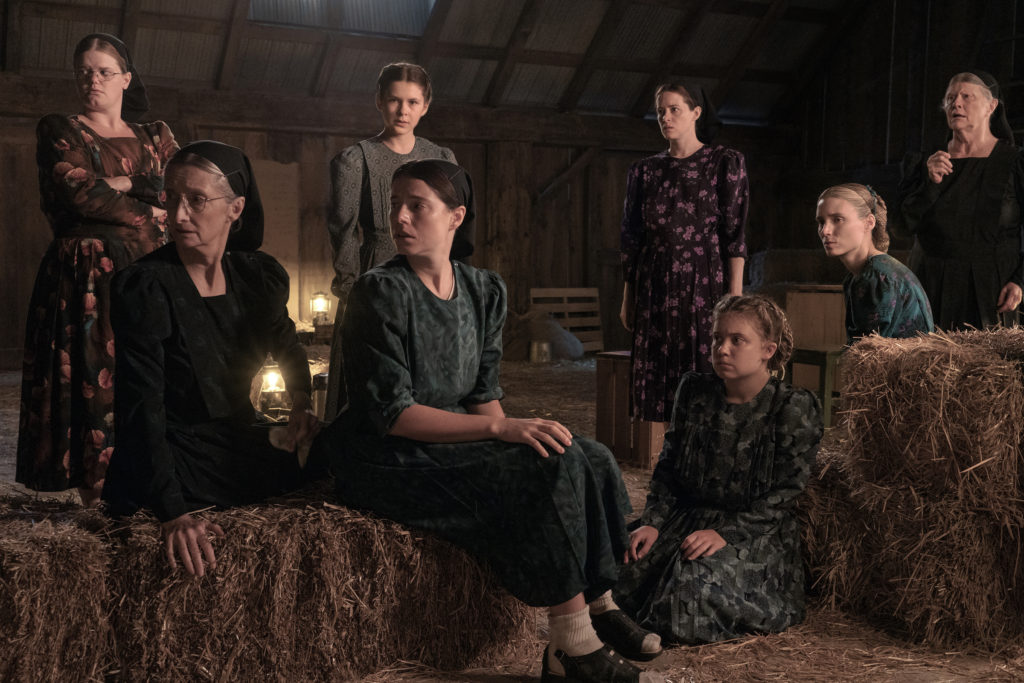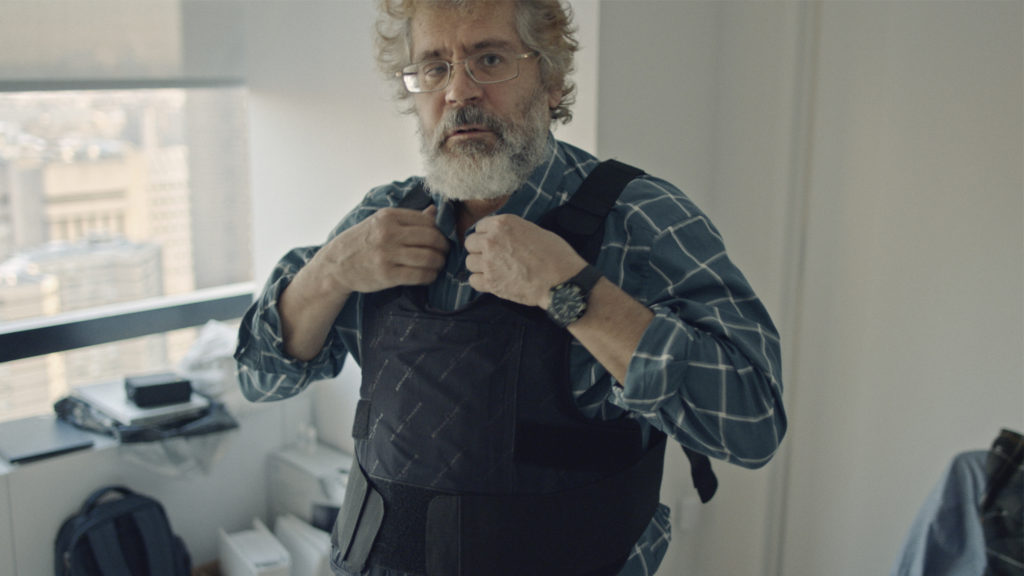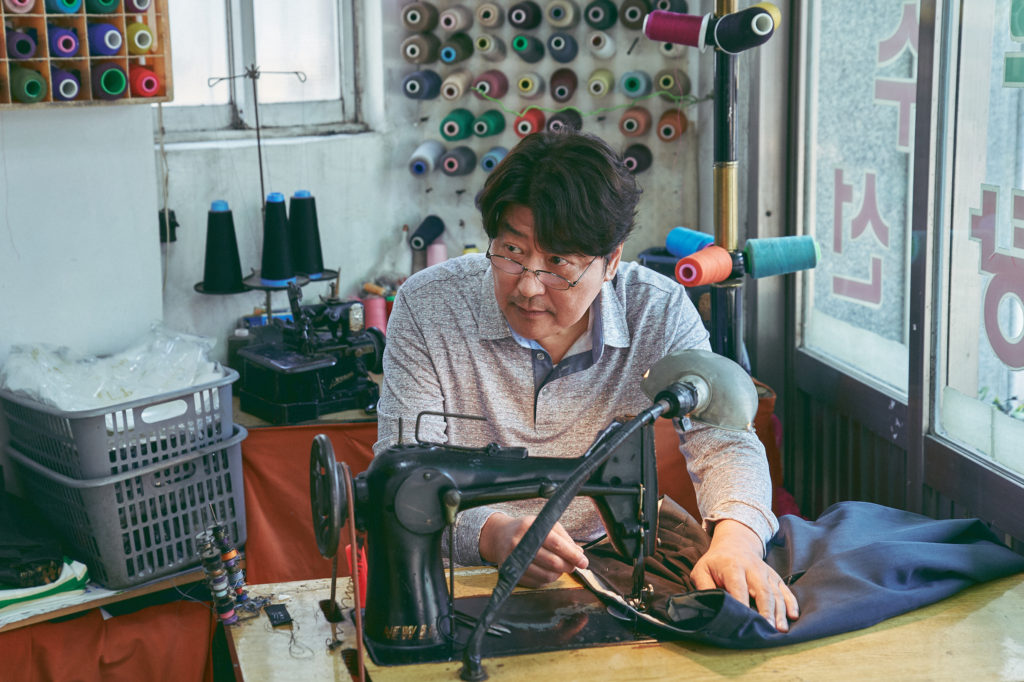After a rush through the annual “feed” that takes over Telluride’s main drag as welcome mixer, I raced to the other edge of town for the main event of the festival’s first day, a tribute to Sarah Polley. A clips reel highlighted her work as a young actor (a fraught time in her life) and subsequent second act as a sensitive, inquisitive, and accomplished film director. Frances McDormand emerged from the audience, “knighted” her with a disposable plastic knife, and presented her with Telluride’s Silver Medallion.

Women Talking (2022 | USA | 104 minutes | Sarah Polley)
The tribute concluded with the world premiere of Polley’s Women Talking, an adaptation of Miriam Toews’s novel, which the film’s title card describes as “an act of female imagination”. In this regard it impossibly goes far darker than the horrific true story of a series of systematic sexual assaults in an isolated Mennonite colony while also granting an unlikely window of opportunity for the victims to claim agency.
Filmed in desaturated digital tones, the story opens with narration from a girl to an unseen child about life before they were born. The details are mercifully brief: for generations, women and girls in the colony awoke from seeming trances bruised, bloody, violated, and often pregnant. When rarely (if ever) spoken of, these assaults were to demons, self-harm, or hallucinations until — one night — two teen girls catch a man in the act of intruding upon a girl dosed with cow tranquilizer. Faced to acknowledge the human depravity, the perpetrators are taken to jail and the women are granted a mere 48 hours to decide whether to forgive their attackers and stay in the enclave (to preserve the possibility of gaining entry into the kingdom of Heaven).
They gather in a hayloft and instead take a vote on a wider range of options: do nothing, stay and fight, or leave. A tie between the last two kicks off a multi-generational debate between several families to determine how to proceed. Denial of primary education left the women illiterate, a lack of schooling hardly impairs the depth and sophistication of their twisty conversation of ideas. As Ona, a “spinster” pregnant with an unknown rapist’s child, Rooney Mara represents the most idealistic debater, questioning the meaning of forgiveness, the complicity of systems, the possibility of innocence, and imagines an outcome by which the women reform the colony to one based on equality. Claire Foy’s enraged Salome can’t imagine any outcome other than staying and killing every perpetrator. And Jessie Buckley’s Meriche finds the entire process ridiculous, with flight as the only viable option. Likewise, the teens who caught the men are easily bored by the ponderous lack of resolve. The oldest generation, while more patient, are burdened by a lifetime of oppression and guilt and are far more ready to arrive at a decision.
As their conversations play out, transcribed by a delicate schoolteacher (Ben Whishaw) deemed trustworthy and harmless enough to take the minutes as an artifact, Polley gives strategically swift flashes of the aftermath of the assaults. Bruised legs, broken teeth, bloody walls tell a complete story in an instant without depicting the actual assaults. The magnificent performances from the entire cast let us fill in the awful blanks, the literal and mental scars evident for years. Amid such heavy material, the film still more than a few occasions for hope, melancholy romance, and levity amid the sprawling green fields that feel a million miles from reality. As the gears turn toward a decision the cast and director’s triumphant collaboration is empowering, enlivening, and deeply thought provoking. A privilege to be flies on the wall to witness these essential if imagined conversations.

Icarus: the Aftermath (2022 | USA | 114 minutes | Bryan Fogel)
Like the festival itself, press and patrons show up for the opening day preview not knowing what’s on the program. This year, festival director Julie Huntsinger introduced Bryan Fogel and the sequel to his Oscar-winning documentary Icarus: the Aftermath. Her explanation for why she’d picked that one for the afternoon’s screening: she was showing it because she wanted to make sure we saw it. Mission accomplished.
The film picks up in the aftermath of his documentary — which started as a personal investigation into how far performance enhancing drugs could elevate an amateur cyclist and turned into an astonishing, sport-rattling, exposé into Russia’s nefariously sophisticated program to foil anti-doping authorities — with charismatic whistleblower and chemistry master Grigory Rodchenkov in hiding. Holed up in a NYC penthouse, with a bad dye job, and trying to exercise away the gut fostered by a stressful life on the run, he finds himself allegedly as #2 on Russia’s kill list. Since the bombshell of the documentary, he’s been discredited by Putin as a liar and a traitor for disclosing the sophisticated deception that he performed on behalf of his country’s chemically-enhanced athletes. While there are occasional sequences suitable for a spy thriller like clandestine efforts to recover key documents or hasty exits when his safety becomes imperiled, the film is largely a chronicle of the lonely life of a late-in-life truth-teller under constant threat.
Their work together in making Icarus forged a deeply meaningful friendship between Fogel and Rodchenkov, and their occasional reunions provide some levity among the grim reminders that their revelations resulted in barely a slap on the wrist for Russia in the world of sport. Intentionally or not, the sequel captures the degree to which reality rarely grants its participants a clear narrative throughline or dramatic thrust. Enriched with accomplished and dreamlike animation that snaps into sharp stylized focus, a primary plotline concerns the recovery of several decades of Rodchenkov’s prized daily diaries, both as supporting evidence in the doping cases as well as personal recollections of his introduction to steroid use. Separately, he pursues an application for asylum as newsreels highlight Russia’s brazen assassinations of enemies, provides a real sense of the danger that has confined Grigory to an undisclosed remote location under constant guard. While it occasionally meanders, it is nevertheless a grim portrait of the loneliness of having left one’s entire life behind in service of doing the right thing.

Broker (2022 | South Korea | 129 minutes | Hirokazu Kore-eda)
The final screening of the night for me was the US premiere of Hirokazu Kore-eda’s unlikely comedic drama about a duo who steal abandoned babies to sell them to high-paying couples desperate to adopt. Perpetually-indebted laundryman Sang-hyeon (Song Kang-ho) and his twentysomething once-orphaned apprentice Dong-soo (Gang Dong-won) are as close to sweet-natured as it’s possible for human traffickers to be, operating out of some delusion that selling infants gives them a better outlook than a life in an orphanage. Hoping to catch them in the act of closing an illegal deal, two female detectives (Bae Doona and Lee Too-young) conduct a fast-food-fueled stakeout and occasionally intervene to nudge their big case closer to closure.
It’s here that the story begins, on a rainy night in Busan, when a young woman (Ji-eun Lee) leaves her child just outside a hospital orphanage (rather than in the designated “baby box” — an increasingly real and timely phenomenon). When the young mother second-guesses herself, she falls in with the con-men and becomes part of the scam. Soon, Kore-eda has assembled an unlikely found family — two men, a prostitute, and a baby with questionable eyebrows — on a picturesque road-trip around Korea in a rickety van. Soon enough, the story sprawls to include a too-cute stowaway, an investigation of a grisly mob-related murder, a failed sting operation, double-crossing deals.
While it’s overstuffed with both plot and social issues, Kore-eda loves these warm-hearted criminals too much to provide anything but a good time. The logic doesn’t always add up, but there are so many pleasures and laughs as they ricochet around the country, that it’s easy to get swept up in his affections. Despite what they’re doing, the bonds that form between the various flock of damaged souls are so sweetly rendered that you can’t help but fall for them and the movie as a whole.
Women Talking had its world premiere in Telluride, United Artists plans a December 2 release; Icarus: the Aftermath‘s premiere was in Telluride and is still seeking distribution; Neon plans to release Broker in the US on December 26.




